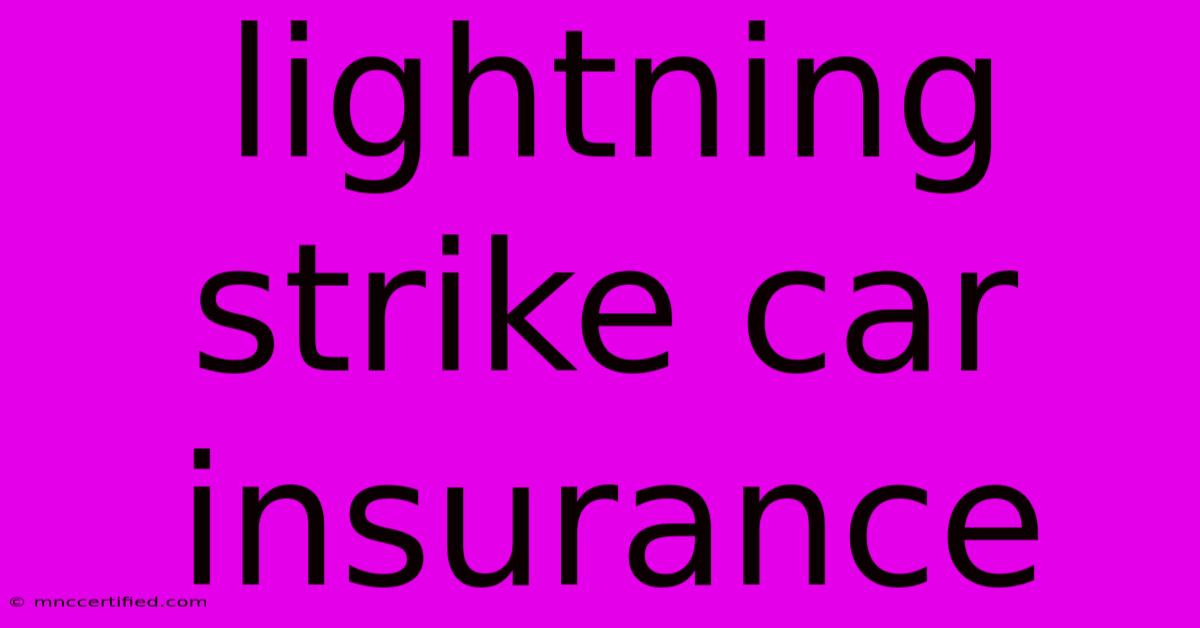Lightning Strike Car Insurance

Table of Contents
Lightning Strike Car Insurance: Are You Covered?
Lightning strikes are rare, but they can cause significant damage to your car. Understanding your car insurance policy and what it covers in such an unlikely event is crucial. This comprehensive guide will help you navigate the complexities of lightning strike car insurance and ensure you're adequately protected.
What Does Lightning Strike Damage Typically Include?
A direct lightning strike to your vehicle can result in a range of damage, from minor cosmetic issues to complete write-off. This can include:
- Electrical System Damage: This is the most common type of damage. Lightning can fry your car's computer systems, electrical components (like the radio, power windows, and lights), and even the engine control unit (ECU). Repairing this damage can be extremely expensive.
- Body Damage: While less frequent than electrical damage, a lightning strike can cause significant body damage, including melting paint, warping metal panels, and shattering windows. The force of the strike can even create dents or punctures.
- Fire: In severe cases, a lightning strike can ignite a fire in your vehicle, leading to total destruction. This is, understandably, the most catastrophic outcome.
Is Lightning Strike Covered Under Comprehensive Car Insurance?
Generally, yes, comprehensive car insurance typically covers damage caused by lightning strikes. Comprehensive coverage protects your car against damage from events other than collisions and theft. Since a lightning strike is an unforeseen and uncontrollable event, it falls under the umbrella of comprehensive coverage.
However, it's crucial to carefully review your specific policy documents. Not all policies are created equal. Some might have specific exclusions or limitations related to weather-related damage, so confirming this aspect with your insurance provider is vital.
What to Do After a Lightning Strike:
- Ensure Your Safety: Before approaching your vehicle, ensure the area is safe and there's no lingering electrical hazard.
- Document the Damage: Take clear photos and videos of the damage from multiple angles. This documentation is essential when filing a claim.
- Contact Your Insurance Provider: Report the incident to your insurance company immediately, providing them with the necessary documentation.
- Avoid Starting Your Car: Attempting to start your car after a lightning strike could cause further damage and potentially exacerbate the problem.
- Obtain Repairs from Approved Mechanics: Your insurer may have a network of approved repair shops. Using their services can streamline the claims process.
Factors Affecting Your Claim:
- Deductible: Remember your deductible – you'll be responsible for paying this amount before your insurance coverage kicks in.
- Policy Limits: Your policy will have a maximum payout amount. If the damage exceeds this limit, you'll be responsible for the difference.
- Pre-existing Damage: If your car already had pre-existing damage, your insurer may not cover the entire cost of repairs related to the lightning strike.
Protecting Yourself:
- Review Your Policy Regularly: Make sure your comprehensive coverage is sufficient and adequately protects your vehicle against unexpected events.
- Consider Increasing Your Coverage: If you're concerned about the potential cost of repairs following a lightning strike, consider increasing your coverage limits.
- Understand Your Deductible: A higher deductible means lower premiums, but you'll pay more out-of-pocket in the event of a claim.
Frequently Asked Questions (FAQs):
Q: Does roadside assistance cover lightning strike damage? A: No, roadside assistance typically only covers breakdowns and minor issues, not extensive damage from a lightning strike.
Q: Can I claim for lost use of my car after a lightning strike? A: Some policies offer coverage for loss of use, allowing you to claim compensation for the period your car is being repaired. Check your policy details.
Q: What if my car is totaled by a lightning strike? A: If your car is deemed a total loss, your insurer will pay you the actual cash value of your vehicle, minus your deductible.
By understanding your car insurance policy and taking the necessary steps after a lightning strike, you can minimize the financial impact of this unusual event. Remember, prevention is key; regularly reviewing your policy ensures you're adequately protected against unforeseen circumstances.

Thank you for visiting our website wich cover about Lightning Strike Car Insurance. We hope the information provided has been useful to you. Feel free to contact us if you have any questions or need further assistance. See you next time and dont miss to bookmark.
Featured Posts
-
Bissonnette Attacked Six Men Involved
Nov 27, 2024
-
Arsenal Star Back After Year Away
Nov 27, 2024
-
Brest Vs Barcelona Predicted Lineups
Nov 27, 2024
-
Student Secure Smart Insurance
Nov 27, 2024
-
Extra Uk Bank Holiday Possible In 2025
Nov 27, 2024